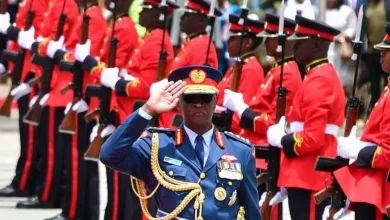International
Democratic debates: Ten candidates clash over healthcare and immigration

Ten Democratic presidential hopefuls have clashed in a televised US debate that laid bare the party’s deep divisions over how best to win in 2020.
Elizabeth Warren and Bernie Sanders, the most liberal candidates in the crowded field, came under attack from their more moderate colleagues.
The three women and seven men on stage in Michigan debated healthcare, border policy and how to defeat Donald Trump.
Ten more Democrats, including Joe Biden and Kamala Harris, will debate on Wednesday.
The winner of the Democratic presidential nomination will be announced next July at the party convention. The presidential election will take place months later, in November.
Several candidates began the debate in Detroit by criticising as unrealistic the policies of Ms Warren and Mr Sanders and not the best way for the party to defeat President Trump.
Who was on stage?
The line-up was chosen at random by CNN:
- Massachusetts Senator Elizabeth Warren
- Vermont Senator Bernie Sanders
- South Bend, Indiana, Mayor Pete Buttigieg
- Former Texas Congressman Beto O’Rourke
- Minnesota Senator Amy Klobuchar
- Ohio Congressman Tim Ryan
- Former Maryland Congressman John Delaney
- Montana Governor Steve Bullock
- Former Colorado Governor John Hickenlooper
- Author Marianne Williamson
What was the key flashpoint?
Healthcare, which has been an important issue for Democrats and was a focus during last year’s mid-term elections, was a point of contention on Tuesday night.
The first question posed to the candidates was whether Mr Sanders’ plan for a single-payer health system, Medicare for All, would be “political suicide”, but healthcare was a recurring topic throughout the debate.
The candidates sparred over enacting Medicare for All versus expanding on former President Barack Obama’s signature policy, the Affordable Care Act, which extended health insurance coverage in 2010.
Mr Ryan and Mr Delaney, who has worked in the healthcare industry, were among those who attacked Mr Sanders’ plan, saying it would negatively impact on working-class Americans by taking away their employer-sponsored health benefits.
Mr Sanders focused on how millions of Americans remain underinsured or uninsured while the health industry makes billions in profits.
Ms Warren sought to refocus the matter slightly, saying that no Democrat is “trying to take away healthcare from anyone”, and that Democrats “should stop using Republican talking points” to discuss with each other.
What were the other clashes?
The 10 candidates on stage also differed on how to handle the crisis at the US-Mexico border.
Mr Buttigieg and Mr O’Rourke – who is from the Texas border region – offered policies to change the existing systems, but said crossings would remain illegal.
But the more liberal lawmakers, Ms Warren and Mr Sanders, both emphasised that families arriving at the border should not be criminalised.
“I’ve seen the mothers, I’ve seen the cages of babies,” Ms Warren said. “We must be a country that every day lives our values and that means we cannot make it a crime when someone comes in.”
Mr Ryan contended that such proposals would only incentivise people to enter the country illegally.
The candidates also tackled issues of race, with Mr O’Rourke and Ms Williamson calling for reparations – a repayment to black citizens for slavery.
The 10 hopefuls largely agreed when it came to gun violence, dark money in politics and the need to address climate change.
Who stood out?
Analysis by Anthony Zurcher, BBC North America reporter
The first Democratic debate felt a little bit like a gang fight, with the candidates breaking into two distinct groups – the moderates and the progressives.
Given that the two progressives, Elizabeth Warren and Bernie Sanders, also happen to be two of the candidates near the top of the polls, this dynamic ended up helping elevate some of the moderate candidates. Up until now, they’ve effectively been crowded out by Joe Biden, the king of the moderates.
He won’t take the stage until tomorrow night, so it was up to candidates like Ohio Congressman Tim Ryan, Montana Governor Steve Bullock and former Maryland Congressman John Delaney to hold up their end of the fight.
That can only be good news for those candidates, who got plenty of airtime to defend and expound upon their views. Will it help any of them rise in the polls? Perhaps if Biden falters again on Wednesday. If not, then the vice-president may be the ultimate beneficiary of Tuesday evening’s proceedings.
Sanders and Warren will also be pleased with their performance. Both held up under fire – and had a chance to demonstrate they could give as well as they get.
Of the two , Warren probably will be happiest, because she’s pulling ahead of Sanders in recent polls and nothing on Tuesday seemed to shake up that dynamic.
Others, like Amy Klobuchar, Beto O’Rourke, John Hickenlooper, Marianne Williamson and even Pete Buttigieg, frequently disappeared into the background. As is frequently the case with debates like these, the quieter voices tend to get lost in the din.
Moderates v liberals
Tuesday’s debate highlighted the divide between the Democratic party’s moderate and liberal sides over what policies would appeal to voters and help unseat President Trump.
Many focused on their own track records in typically Republican districts or states, like Ms Klobuchar in Minnesota and Mr Bullock in Montana.
While some had anticipated Mr Sanders and Ms Warren – who has been surging in the polls – would battle each other, the two seemed to be united by circumstance as they both came under attack.
Mr Bullock, Mr Ryan and Mr Delaney most frequently sparred with Ms Warren and Mr Sanders over their policies.
Mr Delaney was the first to mention the two senators by name, calling out their “free everything” policies as “impossible promises that will turn off independent voters”.
After one back-and-forth with Mr Delaney, Ms Warren drew big applause for saying candidates should not focus on all the things they cannot do.
Ms Klobuchar meanwhile said Democrats should be straightforward, and that “we are more worried about winning an argument than winning an election”.
What’s next?
On Wednesday night, the debates continue with 10 more Democrats taking the stage.
Former Vice-President Joe Biden, California Senator Kamala Harris, New Jersey Senator Cory Booker, Former San Antonio Mayor Julian Castro, New York Senator Kirsten Gillibrand, Colorado Senator Michael Bennet, Hawaii Congresswoman Tulsi Gabbard, Washington Governor Jay Inslee and New York Mayor Bill de Blasio, Former tech executive Andrew Yang will have their chance to win over voters.
For now, Mr Biden continues to hold a significant lead in the polls. Emerson and Quinnipac University polls released this week both reported Mr Biden has over 30% of the vote, with other candidates at 20% or below.
Who will take on Trump in 2020?
Twenty Democrats are debating once more to win the chance to take on Donald Trump.
Source: BBC



